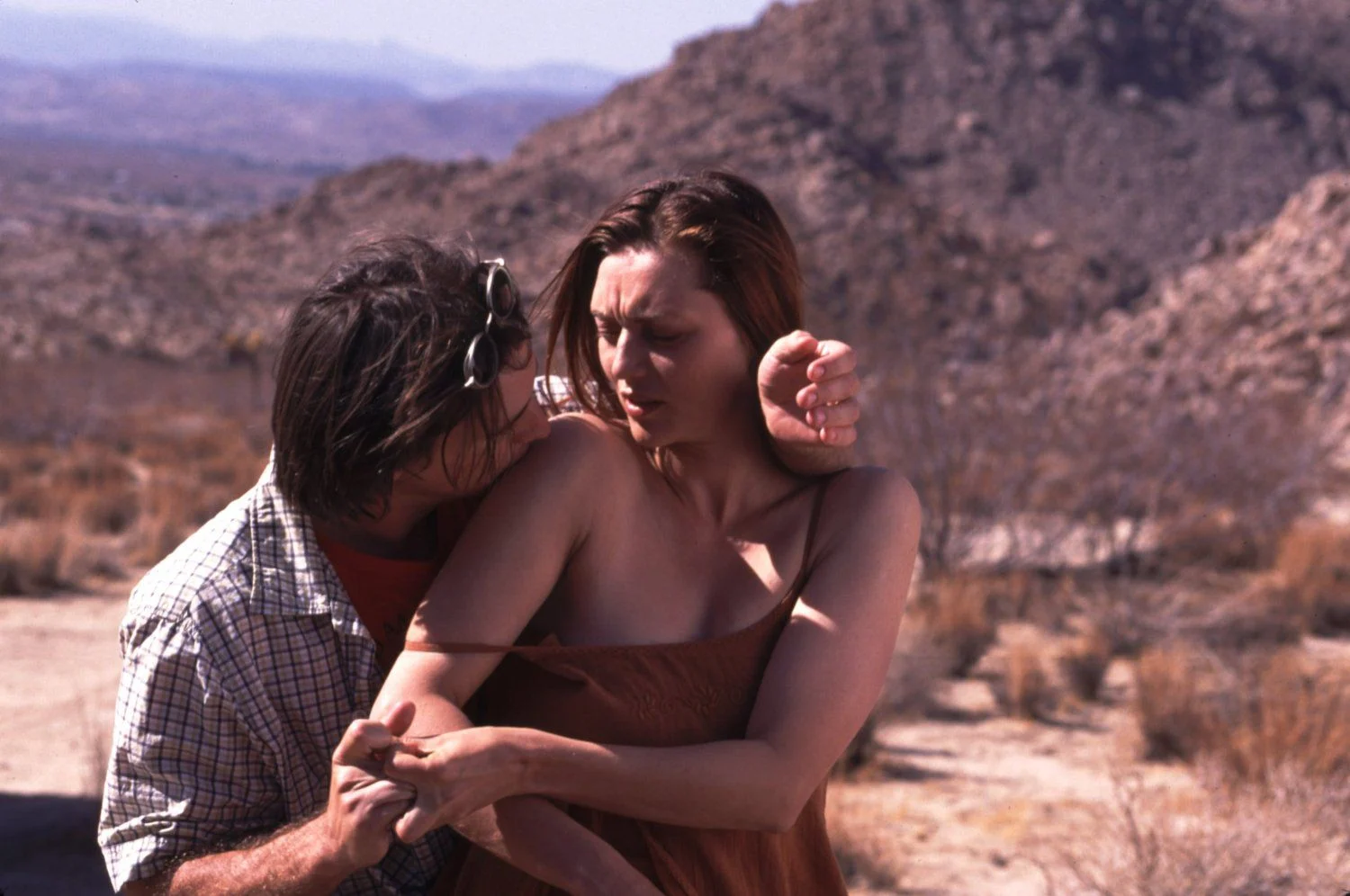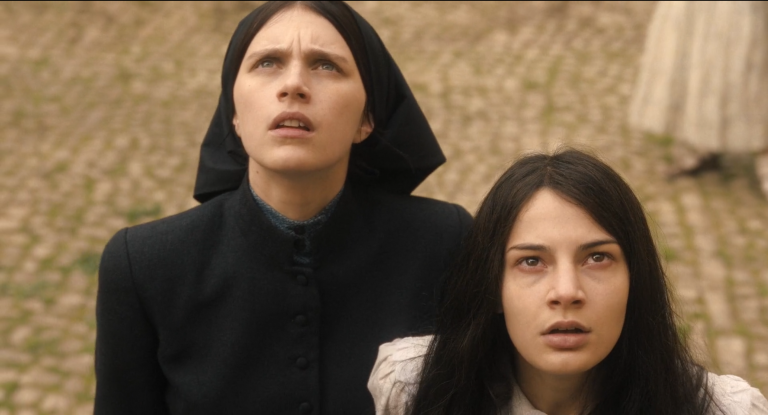Let it not be said that Bruno Dumont falls back on button-pushing. His penchant for humanity’s base instincts and the poker-faced manner with which he goes about them is often the subject of mockery. What he is on track with, in fact, as in the New Extremity Canon Twentynine Palms (2003), is expanding the realm of possible experience—as all great fiction does— and broadening the margins of feeling. It redrafts the emotional spectrum and offers moments that elicit emotions one couldn’t put their finger on thus far and actions that would have seemed impossible to make sense of. The film takes no prisoners. It tears through the scale of emotional measure.
Probably no other film better reflects on the comprehensive phenomenon of happenstance—a cosmic arbitrary with no scope for intervention—than Palms. The film’s final stretches culminate in an action so jaw-droppingly perfect that it betrays nothing that the film has built up seemingly offhandedly but actually very carefully leading up to that point. Dumont knows what he is doing. In hindsight, all the roundabout drifting and rambling suddenly make sense.
The first image we see in the film is of David (David Wissak) steering himself and Katia (Katia Golubeva) in the direction of the eponymous town. The film will chronicle the few days they’ll linger there. The hodge-podge of a city feels as if it stands at the edge of the world and shouldn’t exist in the first place. A spiritual vacuum with a veneer of normalcy, where only strangers and the strange come to pass, and humankind has regressed to a bestial state. What David and Katia will experience here comes dangerously close to that gaping frenzy. Dumont patiently establishes the daily rhythms and the hypnotizing stasis of the visit. A lot of time seems to pass, yet none at all. Moments and gestures repeat as if you’ve reached the end of the tunnel, only for it to extend further. All building up to a precise hour.
With its surreal overlays, Twentynine Palms ditches any glaring dichotomies and remains aesthetically ambivalent toward the landscape. Serenity and menace coexist in this sprawl. Dumont handles the tightrope walk masterfully, never once losing his footing. There’s a blink-and-miss moment with an older couple towards the end of the film, which might seem throwaway but is actually emblematic of Dumont’s aesthetic strategy. The relatively warm manner of the moment briefly lulls us into ease and drowns out the air of dread. Then, the rug is pulled. The central couple takes the workday facade of the city at face value and is utterly blindsided.

The images drain the streets of people; the few faces that we do see register as if they wandered off and stumbled upon the wrong place. There’s no rhyme or reason to the zone. A car passes by the couple on an empty trail, but it’s impossible to look inside. Most of the time, there’s no one else about—only pathways, wrong turns, and dead ends that fold in on themselves. There’s a brief glimpse of a dust cloud just out of view. Someone may or may not have been trailing.
The pair is in free fall, and it’s a long way down. At times, they appear as little children trying to get hold of their surroundings, suspended and completely out of their depth. Their emotional states appear as though they’ve somehow interlocked with their environment. The guards and rehearsed personas are let down, the psyches begin to crack, and the tamed unleash their repressed sides. The film features one of the most hair-raising moments I’ve ever witnessed in a movie. And a shriek for the ages. Most of us will never hear that sound, but we know exactly what it is.
Twentynine Palms isn’t interested in presenting stock conventions or psychological models through its characters. This isn’t a matter of narrative laziness. Through its anti-Freudian bent, it skips right past the dogmatic methods and hacky platitudes plaguing the current cinematic vocabulary. Dumont likes to leave some gaps and cherishes the confrontation it causes with the viewer. He suppresses any inquiry into motives, blanks out personal histories, or any modicum of insight into the relationship. Things don’t quite add up. Action is detached from cause, and motivations are kept at arm’s length.
Since no insight is afforded into the characters or their relationship before we see them, it is difficult to say if the dysfunctionality is the usual course of action or if the characters are acting upon impulses set loose and magnified by the zone. There’re breakdowns, buried tensions boiling up to the surface, elliptical exchanges where no one states quite the obvious, and anti-erotic fuck routines devoid of tenderness and bordering on the predatory. The speech itself is reduced to a meaningless echo. Between the two of them, they make do with what they have. Seeing a forlorn older man all alone in the middle of nowhere prompts Katia to grab David’s arm. It’s mighty clear after a while that the placating routine cannot possibly sustain the length of the film and is just waiting to be hammered down.
Free from the unnecessary constraints of conventional dramaturgy, the film telegraphs a stark vision of the world not reducible to any form of labored cultural commentary, à la a cynical outsider’s view of America, or vacuous nihilism. With its intense telescoping of emotion, the film taps into an existential maxim, slowly shape-shifting into an experimental horror film even as it ditches many of the familiar contours of the genre. The naturalistic framework might also distract from the tale’s mythical underpinnings. It is essentially a story of stories—a primordial archetype pared down to the bedrock, realized in everyday, familiar places.
Twentynine Palms’ dramatic power is inseparable from the way it makes palpable fateful abstractions, which makes for the decisive narrative thrust of the film. It can’t be reasoned or bargained with. What we have here is not a tragedy but the brute fact of it all: succumbing to and perishing when confronted with what awaits all of us at the end of the road. For a film that has to do with time, it contends that our future is contained in the present, and the end is built into the beginning—that everything passes, even suffering. Maybe the palms had been waiting for David and Katia. Right there. Moving towards them all their lives. Every action leading them to this patch of land. Or maybe they just happen to be at the wrong place at the wrong time.
Read More:
The Rainbow Shades in ‘Guns and Gulaabs’: A Critique on the Show’s Representation of Queer Identity
Lee Chang-dong’s ‘Oasis’ and the Eligibility of Love
Why Everyone Needs to See ‘Desert Hearts’ This Pride Month





![Ayar [2021]: ‘NBFF’ Review – Bold attempt at Pandemic infused cocktail of meta and narrative filmmaking](https://79468c92.delivery.rocketcdn.me/wp-content/uploads/2021/07/Ayar-North-Bend-FF-highonfilms-1-768x322.jpg)
